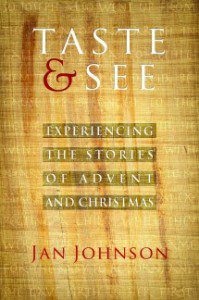 When I received my copy of Jan Johnson’s Taste and See: Experiencing the Stories of Advent and Christmas for the Patheos Book Club, I did a double take – Advent and Christmas already! Of course, as an earnest senior pastor, aiming at balancing excellence and stress reduction in my ministry and the ministry of our congregation, South Congregational Church, United Church of Christ, in the village of Centerville on Cape Cod, Massachusetts, I had already met with my pastoral colleagues to talk about the village’s annual Christmas stroll and chart out our Advent-Christmas worship schedule; but finding the book in my Saturday mail was a wakeup call for me as a pastor and as a spiritual leader. In just a few weeks, the Christmas ads will surface and the season of Advent will be lost in the shuffle. As I write this review, it is a scant 75 days till Christmas!
When I received my copy of Jan Johnson’s Taste and See: Experiencing the Stories of Advent and Christmas for the Patheos Book Club, I did a double take – Advent and Christmas already! Of course, as an earnest senior pastor, aiming at balancing excellence and stress reduction in my ministry and the ministry of our congregation, South Congregational Church, United Church of Christ, in the village of Centerville on Cape Cod, Massachusetts, I had already met with my pastoral colleagues to talk about the village’s annual Christmas stroll and chart out our Advent-Christmas worship schedule; but finding the book in my Saturday mail was a wakeup call for me as a pastor and as a spiritual leader. In just a few weeks, the Christmas ads will surface and the season of Advent will be lost in the shuffle. As I write this review, it is a scant 75 days till Christmas!
One of my pastoral colleagues describes herself as an “Advent fundamentalist,” affirming her desire to hold off Christmas carols until Christmas Eve or, if you can’t wait, the Sunday before Christmas. While that isn’t my approach – I just had the congregation sing “Joy to the World” in the middle of September – there is a virtue in savoring the seasons of the Christian year and what better way to do this than to “taste and see” the Advent and Christmas stories, and to become part of the story yourself. That’s the heart of Jan Johnson’s invitation to live a holy Advent and Christmas.
The words of Psalm 46:10 proclaim “pause awhile and know that I am God” (other translations say “be still and know that I am God”) and this is good advice in the maelstrom of December activities. If we pause and look at the announcement and birth stories in a new way, we may discover that the bible is a living text, applicable to our lives, and not just an irrelevant fairy tale, chock full of myths or what others cite as literal events (that deep down we think didn’t occur) distant from our lives. Johnson’s use of the Ignatian approach to scripture, focusing on the imagination as a way of observing scriptural events or becoming part of them ourselves enables scripture to come alive as our story, not just an era piece.
My own sense is that the bible is an adventure book, whose primary purpose is to invite us to join the pilgrimage of faith. Beneath our contemporary responsibilities, we are Zechariah and Elizabeth, the unexpected parents of John the Baptist; we are also Zechariah, Mary, and Joseph, encountering angels in the midst of everyday life; we are shepherds and magi, being beckoned toward something whose appearance will change everything. We come to the stable, astonished, afraid, and awestruck.
In seeing the bible as an adventure book, we are invited to go beyond “fact” to discover “truth.” The biblical stories, and most especially the birth narratives, are shrouded in metaphysics and mystery. They are, at face value, unbelievable, and can be deconstructed by analyzing them alongside stories of other great historical figures such as Augustus Caesar. But, there is something deeper than fact in these stories: we need unexpected births, we need angels and life-changing dreams, and we need a star to guide our way, to deliver us from the mundane circle of events and the anxieties of mortality. We need to believe that life has more in store for us than consumerism, hurry, and fear of terrorism. We need a mysterious birth and a hopeful resurrection. We need to “taste and see” that God is with us, providing us with new pathways to adventure and revealing the wondrous realities lurking around each corner.
We are part of the living story, or the story really doesn’t matter. We are also creating the new Christian story as we go along. In the current spiritual landscape, only a holy imagination can transform our congregations. Only an experience of divinity in our midst can lift us up beyond the statistics of shrinking budgets, membership loss, and continuing disestablishment of Christendom. Perhaps, in the wonder engendered by tasting and seeing God’s presence in the Advent and Christmas stories, a light will shine from our congregations that will guide the path of other pilgrims and give birth once again to the radical amazement of that first Christmas.












